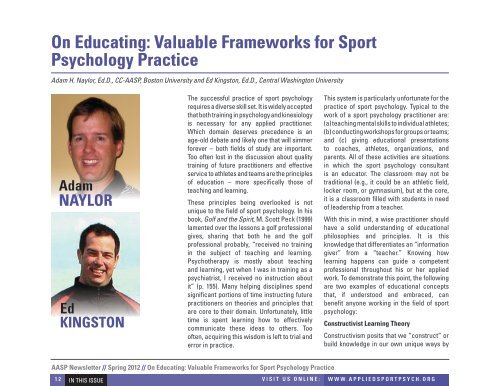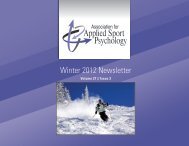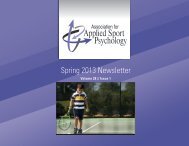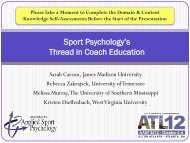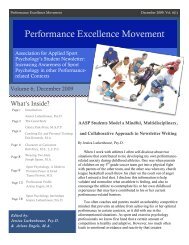Spring 2012 Newsletter - Association for Applied Sport Psychology
Spring 2012 Newsletter - Association for Applied Sport Psychology
Spring 2012 Newsletter - Association for Applied Sport Psychology
Create successful ePaper yourself
Turn your PDF publications into a flip-book with our unique Google optimized e-Paper software.
On Educating: Valuable Frameworks <strong>for</strong> <strong>Sport</strong><br />
<strong>Psychology</strong> Practice<br />
Adam H. Naylor, Ed.D., CC-AASP, Boston University and Ed Kingston, Ed.D., Central Washington University<br />
Adam<br />
NAYLOR<br />
Ed<br />
Kingston<br />
The successful practice of sport psychology<br />
requires a diverse skill set. It is widely accepted<br />
that both training in psychology and kinesiology<br />
is necessary <strong>for</strong> any applied practitioner.<br />
Which domain deserves precedence is an<br />
age-old debate and likely one that will simmer<br />
<strong>for</strong>ever – both fields of study are important.<br />
Too often lost in the discussion about quality<br />
training of future practitioners and effective<br />
service to athletes and teams are the principles<br />
of education – more specifically those of<br />
teaching and learning.<br />
These principles being overlooked is not<br />
unique to the field of sport psychology. In his<br />
book, Golf and the Spirit, M. Scott Peck (1999)<br />
lamented over the lessons a golf professional<br />
gives, sharing that both he and the golf<br />
professional probably, “received no training<br />
in the subject of teaching and learning.<br />
Psychotherapy is mostly about teaching<br />
and learning, yet when I was in training as a<br />
psychiatrist, I received no instruction about<br />
it” (p. 155). Many helping disciplines spend<br />
significant portions of time instructing future<br />
practitioners on theories and principles that<br />
are core to their domain. Un<strong>for</strong>tunately, little<br />
time is spent learning how to effectively<br />
communicate these ideas to others. Too<br />
often, acquiring this wisdom is left to trial and<br />
error in practice.<br />
This system is particularly un<strong>for</strong>tunate <strong>for</strong> the<br />
practice of sport psychology. Typical to the<br />
work of a sport psychology practitioner are:<br />
(a) teaching mental skills to individual athletes;<br />
(b) conducting workshops <strong>for</strong> groups or teams;<br />
and (c) giving educational presentations<br />
to coaches, athletes, organizations, and<br />
parents. All of these activities are situations<br />
in which the sport psychology consultant<br />
is an educator. The classroom may not be<br />
traditional (e.g., it could be an athletic field,<br />
locker room, or gymnasium), but at the core,<br />
it is a classroom filled with students in need<br />
of leadership from a teacher.<br />
With this in mind, a wise practitioner should<br />
have a solid understanding of educational<br />
philosophies and principles. It is this<br />
knowledge that differentiates an “in<strong>for</strong>mation<br />
giver” from a “teacher.” Knowing how<br />
learning happens can guide a competent<br />
professional throughout his or her applied<br />
work. To demonstrate this point, the following<br />
are two examples of educational concepts<br />
that, if understood and embraced, can<br />
benefit anyone working in the field of sport<br />
psychology:<br />
Constructivist Learning Theory<br />
Constructivism posits that we “construct” or<br />
build knowledge in our own unique ways by<br />
AASP <strong>Newsletter</strong> // <strong>Spring</strong> <strong>2012</strong> // On Educating: Valuable Frameworks <strong>for</strong> <strong>Sport</strong> <strong>Psychology</strong> Practice<br />
12 In This Issue<br />
Visit us Online:<br />
www.appliedsportpsych.org


